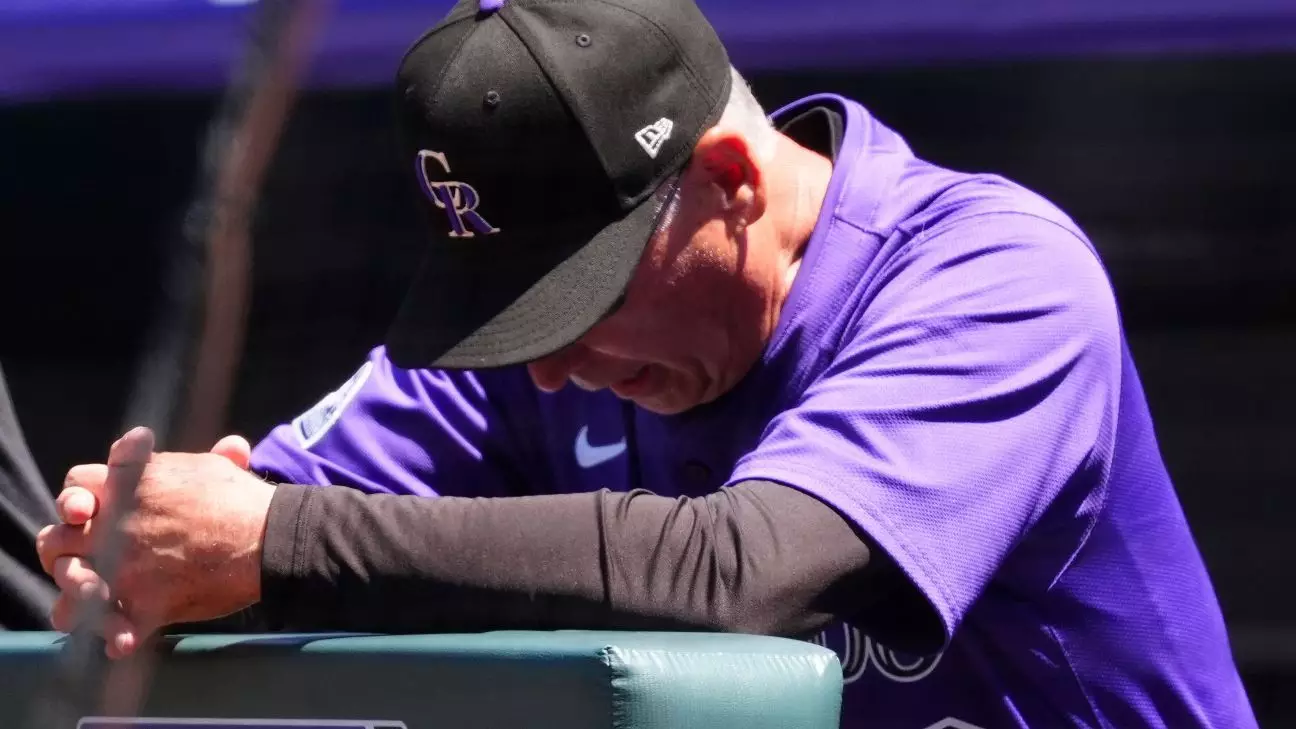The Colorado Rockies experienced a seismic shift in their organization this past weekend, abruptly parting ways with long-standing manager Bud Black. This decision came on the heels of a record-shattering defeat, where the Rockies succumbed to the San Diego Padres by a staggering 21 runs. Despite managing to salvage one game in the series with a 9-3 victory, the Rockies find themselves in a disarray that has cast a long shadow over the franchise. With a woeful record of 7-33, they currently hold the dubious honor of having the worst start in Major League Baseball.
In an environment where expectations have continually plummeted, the Rockies opted to appoint a fresh interim leadership team to navigate the rocky waters ahead. Warren Schaeffer, the third-base coach, and Clint Hurdle, the hitting coach, will now shoulder the responsibility of righting the ship. While such transitions can often inject a much-needed adrenaline rush into a struggling club, the challenges before them are monumental.
Unacceptable Performance
Rockies owner Dick Monfort made a damning statement following the managerial changes, emphasizing the unacceptable quality of the team’s performance this season. The Rockies have not only underperformed on the field but have been unable to connect with a fanbase that deserves a competitive team. Monfort’s frank acknowledgment of the situation underscores the reality that change was imperative—not just for the sake of the organization but for the loyal supporters who endure the ups and downs of being a Rockies fan.
The statistics are hard to ignore; the Rockies’ current trajectory mirrors one of the worst starts in MLB history, reminiscent of the infamous 1988 Baltimore Orioles. Monfort expressed a hope for improvement in the remaining months of this season, aiming to lay the groundwork for a more promising future. This shift in leadership could signal the dawn of a new era for a franchise known for its highs and lows.
The Weight of History
Bud Black’s tenure, lasting nearly a decade, saw him become the winningest manager in Rockies history. However, recent seasons have been marked by frustration, disappointment, and a significant decline in performance. After back-to-back playoff appearances in 2017 and 2018, the Rockies have been unable to replicate that success, culminating in two consecutive 100-loss seasons. The current statistical analysis shows that the team’s .353 winning percentage since 2023 has further highlighted their struggles.
Despite Black’s initial success, it appears that the franchise could not escape a hamster wheel of mediocrity that continued to spin despite promises of change. The decision to part ways with him was, therefore, not just a reaction to the poor start but a reflection of a broader need for a transformative approach that could rejuvenate the team both on and off the field.
Leadership and Team Culture
The contrasting sentiments regarding Black’s potential to turn the season around reveal the complexities involved in sports management. General manager Bill Schmidt held onto hope until the very end, repeatedly asserting his belief in the team’s capability to rebound. This rightfully emphasizes the dual nature of a managerial role—leaders must navigate not only wins and losses but also the psychological landscape of their players. However, amidst frustration becomes an urgent call for collective effort rather than individual blame.
As the Rockies head into a new chapter, the focus must shift toward rebuilding a culture that fosters accountability, resilience, and determination. While the transition to interim managers may provide a temporary respite, it is the underlying commitment of the players and the front office to work together that will ultimately define the organization’s trajectory moving forward.
The Road Ahead
The Rockies face an uphill battle as they prepare to hit the road against the Texas Rangers. As they embark on this critical trip, all eyes will be on Schaeffer and Hurdle to see how they galvanize the team into action. With a monumental task ahead, these interim leaders will need to harness the energy and talent within their roster to cultivate a winning mindset—while simultaneously focusing on the lessons learned through adversity.
The Rockies stand at a crossroads, ripe for change. Whether this managerial shake-up will pave the way for renewed hope or simply serve as a brief intermission in their ongoing struggle remains to be seen. The pulse of Rockies baseball is tentative yet alive, and fans will be eagerly watching to see if this latest reconfiguration can reclaim the competitive spirit that once defined the franchise.

